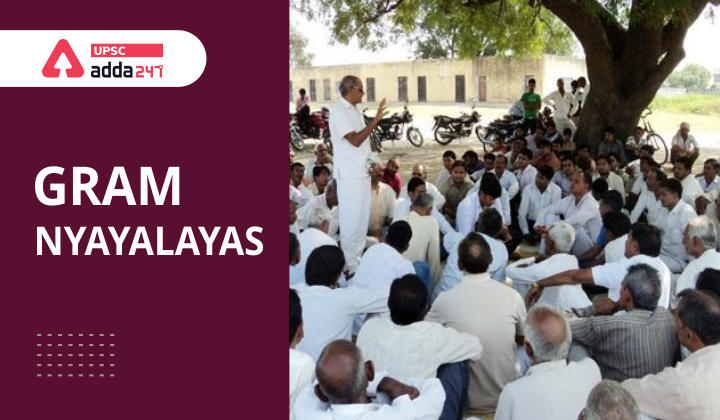Table of Contents
Gram Nyayalayas- Relevance for UPSC Exam
- GS Paper 2: Indian Constitution- Structure, organization and functioning of the Executive and the Judiciary Ministries and Departments of the Government.
Gram Nyayalayas in news?
- As per information made available by State Governments/High Courts, 476 Gram Nyayalayas have been notified so far by 15 States/UT.
- Out of these, 257 are operational in 10 States at present.
Key Facts about Gram Nyayalayas
- Background: The Law Commission of India had suggested the establishment of Gram Nyayalayas for providing affordable and quick access to justice to the citizens at their doorsteps.
- Associated Legislation: Gram Nyayalayas are established under the Gram Nyayalayas Act 2008 which came into force with effect from 02nd October, 2009.
- Gram Nyayalayas: The Gram Nyayalayas Act 2008 provides for the establishment of Gram Nyayalayas at the intermediate Panchayat level.
- Establishment of Gram Nyayalayas: The State Governments are responsible for establishing Gram Nyayalayas in consultation with the respective High Courts.
- However, the Act does not make the setting up of Gram Nyayalayas mandatory.
- Judicial Status: Gram Nyayalayas are deemed to be a Court of Judicial Magistrate of First Class with both civil and criminal jurisdiction to settle petty disputes at the village level.
- Financial Support by Centre: For the opening of Gram Nyayalayas, the Central Government has been encouraging the States by way of providing financial assistance.
- The scheme has since been extended by the Government for five years till 2026 at a budgetary outlay of Rs.50 crores allocated for the Gram Nyayalayas Scheme.
- The funds for the Gram Nyayalayas will be released only after they have been notified as well as made operational along with the appointment of Nyayadhikaris and reported on the Gram Nyayalayas Portal of the Department of Justice.
Supreme Court Allows Legal Sand Mining in Rajasthan
Key Features of the Gram Nyayalayas Act
- Gram Nyayalayas are aimed at providing inexpensive justice to people in rural areas at their doorsteps;
- Gram Nyayalayas are to be established for every Panchayat at the intermediate level or a group of contiguous Panchayats at an intermediate level or for a group of contiguous Gram Panchayats;
- The seat of the Gram Nyayalayas shall be located at the headquarters of the intermediate Panchayat.
- The Nyayadhikari shall periodically visit villages and may hear the parties and dispose of the cases at the place other than its headquarters;
- The Gram Nyayalayas will try criminal cases, civil suits, claims, or disputes which are specified in the First Schedule and the Second Schedule to the Act.
- They are to follow the summary procedure in a criminal trial.
- Disputes are to be settled as far as possible by bringing about conciliation between the parties and for this purpose, the Gram Nyayalayas will make use of the conciliators to be appointed for this purpose;
- The Gram Nyayalaya shall not be bound by the rules of evidence provided in the Indian Evidence Act, 1872 but shall be guided by the principles of natural justice subject to any rule made by the High Court.
National Legal Services Authority (NALSA)





 TSPSC Group 1 Question Paper 2024, Downl...
TSPSC Group 1 Question Paper 2024, Downl...
 TSPSC Group 1 Answer key 2024 Out, Downl...
TSPSC Group 1 Answer key 2024 Out, Downl...
 UPSC Prelims 2024 Question Paper, Downlo...
UPSC Prelims 2024 Question Paper, Downlo...
